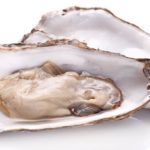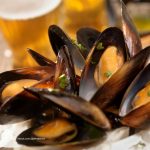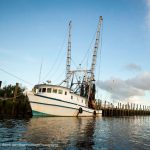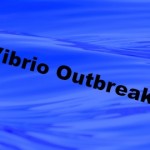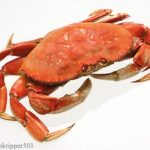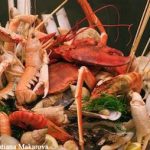A Potters Pond Campylobacter outbreak has closed the area, which is used for shellfish harvesting, in Rhode Island after seven people got sick with the bacterial infection, according to the Rhode Island Department of Environmental Management and the Rhode Island Department of Health (RIDOH). Potters Pond is located in South Kingston, Rhode Island. The pond is going to remain closed until further notice. An investigation linked the illnesses to shellfish harvested in the area. A shellfish sample collected by RIDOH tested positive for Campylobacter Iari. The shellfish sample doses not match the illnesses from the investigation, however, the positive shellfish sample does indicate the presence of Campylobacter in the pond. More samples are being collected and tested. Two of the … [Read more...]
Washington Beaches Closed to Shellfish Harvesting Because of DSP
Beaches in Washington state have been closed to shellfish harvesting because officials have found okadaic acid, which causes Diarrhetic Shellfish Poison (DSP), in some tested shellfish. The toxin was found at unsafe levels in shellfish samples taken as part of routine sampling. The closure covers clams, oysters, mussels, geoduck, and scallops. The toxin is produced by naturally occurring algae called the dinoflagellate Dinophysis. Shellfish are filter feeders, pumping water through their systems and filtering out and eating algae and other particles. The shellfish eat these algae and retain the toxin in their flesh. All species of shellfish can accumulate this toxin. The beaches run from Three Tree Point south to the Pierce County line, and including Des Moines Marina Park, … [Read more...]
Oceana Asks for Turtle Excluder Devices for Wild Caught Shrimp
Oceana is calling on the Obama administration to require the use of improved Turtle Excluder Devices (TEDs) to save sea turtles and reduce wasted seafood. These devices are metal grates inserted into shrimp nets that allow the turtles and other wildlife to escape. Many shrimp boats in the Southwest have been forced to use TEDs since the 1980s, but more than 2,000 skimmer trawls are exempt. Those trawls could be killing 50,000 endangered and threatened sea turtles every year. In 2013, shrimp trawl fisheries in the Gulf of Mexico threw away 62% of its total catch of ocean wildlife that were caught in the nets. Lora Snyder, campaign director at Oceana, said in a statement "protecting sea turtles and U.S. fishing interests do not have to be mutually exclusive. Requiring TEDs in all … [Read more...]
Shellfishing Stopped in New York After Vibrio Outbreak
The New York Department of Environmental Conservation (DEC) has temporarily closed shellfishing areas in the Town of Huntington in Suffolk County after reports of foodborne illness. Lab tests have found that a "number of illnesses" were caused by the bacteria Vibrio parahaemolyticus, which is naturally occurring. The ban is effective starting Friday, September 5, 2014. This precautionary measure is being taken to protect public health until investigators decide if the shellfish are safe to eat. There is no word on how many people have been sickened. The ban on oyster harvesting affects about 4,400 acres, including all of Centerport Harbor, Duck Island Harbor, Northport Bay, Lloyd Harbor and a portion of Huntington Bay. The ban on hard clams affects 2,300 acres and includes all of … [Read more...]
Maine Closes Area at Penobscot River to Crab and Lobster Harvest
The Maine Department of Marine Resources has closed a seven square mile area at the mouth of the Penobscot River to crab and lobster harvest for a minimum of two years. This closure will take effect February 22, 2014. Commissioner Patrick Keliher said, "this closure is being taken as a precautionary measure in response to information the Department of Maine Resources recently received about mercury contamination in muscle tissue from lobsters found in this area." The information is from a federal court ordered study prompted from a lawsuit against a chemical company, HoltraChem Manufacturing, that allegedly dumped mercury into the river. State officials were briefed about the high levels of mercury contamination in 2010. The Maine Department of Marine Resources said it didn't find out … [Read more...]
Californians Warned to Avoid Bivalve Shellfish From Two Areas
The California Department of Public Health (CDPH) is telling consumers not to eat recreationally harvested mussels, clams, or whole scallops from two areas because the shellfish may have dangerous levels of paralytic shellfish poisoning (PSP) toxins. The regions are Monterey Bay and Inner Tomales Bay in Marin County. This warning is in addition to the annual mussel quarantine that was extended on October 31, 2013 for northern Humboldt County. That quarantine remains in effect. This warning doesn't apply to commercially harvested and sold clams, mussels, scallops, or oysters from approved harvest areas. State law allows only state-certified commercial shellfish harvesters or dealers to sell those foods. The shellfish are subject to frequent mandatory testing to monitor for these … [Read more...]
Washington Closes Shellfish Harvesting Areas
Shellfish harvesting areas near public beaches in Washington state have been closed to recreational and sport harvest due to the dangers of fecal contamination and marine biotoxins. Commercial harvesting may also be restricted based on selective testing, according to state health authorities. In addition, some areas have been listed as “threatened” meaning they are reaching the cut-off limit of what is acceptable in terms of water pollution. “If water quality in the threatened shellfish areas gets worse we’ll have to restrict or close harvesting there,” Bob Woolrich, Growing Area Section Manager said in a statement. “Having an area listed as ‘threatened’ is a signal to communities to identify and correct pollution problems.” In some areas, pollution-mitigation efforts are underway. … [Read more...]
